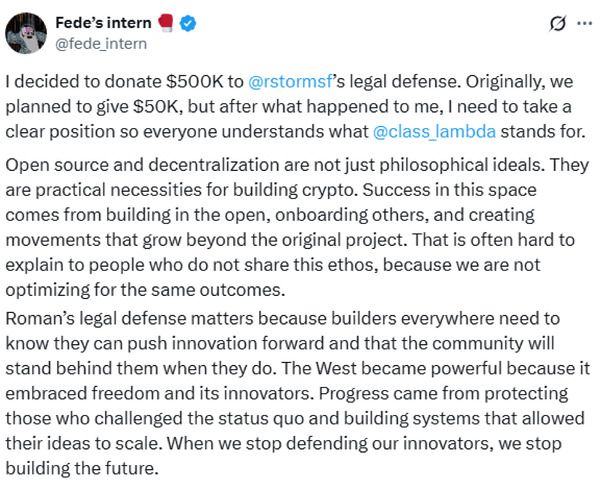⚖️ Roman Storm, Tornado Cash & the Future of Crypto Privacy
-

Roman Storm’s conviction is shaping up as one of the most important crypto-legal battles since Silk Road.
Why? Because it sits right at the intersection of:
Immutable code vs. criminal intent
Privacy rights vs. public safety
Commodity vs. security classification
Let’s unpack.
 1. What makes Tornado Cash different from Silk Road?
1. What makes Tornado Cash different from Silk Road?
Ross Ulbricht argued he just “built the platform.” The courts said otherwise: because Silk Road was designed with criminal use in mind, he was liable.Storm’s defense hinges on the fact that Tornado Cash is immutable smart contracts — once deployed, no one “controls” them. In fact, in the Van Loon v. Treasury case, courts ruled immutable contracts aren’t property.
The prosecution’s counter? Mens rea — if you design the tool with intent for it to be misused, that intent sticks. Lack of control later doesn’t erase responsibility at creation.
 ️ 2. Privacy vs. Security: An Old Fight, New Arena
️ 2. Privacy vs. Security: An Old Fight, New Arena
This isn’t the first time privacy tech has been on trial. Think:WhatsApp encryption debates.
Apple vs. FBI over the San Bernardino iPhone.
Governments argue: privacy can’t come at the expense of public safety.
Crypto purists argue: privacy is a human right.The Tornado Cash conviction forces the question: is privacy tech itself criminal — or only its misuse?
 3. Legal Grey Zones: No “Crypto Privacy Law” Exists
3. Legal Grey Zones: No “Crypto Privacy Law” Exists
As Charlyn Ho notes, there’s no statute that directly protects “crypto privacy.” Instead, we rely on:State-level privacy laws (e.g. California CCPA, treating wallet addresses as personal data).
Broad regulatory interpretation of “pseudonymous” data that can be re-linked to identities.
So Storm’s case is being squeezed into frameworks never designed for blockchain.
 4. Global Policy Split
4. Global Policy SplitUS: leaning toward stablecoins = okay, mixers = risky.
EU/China: favor CBDCs (state control) over crypto privacy tools.
Hong Kong: encourages stablecoin development even while China bans it locally.
The White House itself is split: Its own July report praised self-custody & individual freedom, while Storm’s conviction shows prosecutors taking the opposite stance.
 5. Why Classification Matters
5. Why Classification Matters
The SEC vs. CFTC tug-of-war still rages. The proposed CLARITY Act aims to define what’s a commodity vs. what’s a security. Until that’s settled, crypto builders face liability whiplash.If Tornado Cash is considered “infrastructure,” then Storm is guilty of intent.
If it’s considered “just code,” then liability should evaporate. Takeaway
Takeaway
Roman Storm’s conviction isn’t just about mixers. It’s about whether writing decentralized code can make you criminally liable forever.For developers, that’s existential. For regulators, it’s precedent-setting. For traders? It’s another reminder that privacy coins, mixers, and on-chain anonymity are going to be the next battleground in U.S. crypto policy.
 Question for the room: Is Storm’s conviction justice served, or does it cross the line into criminalizing code itself?
Question for the room: Is Storm’s conviction justice served, or does it cross the line into criminalizing code itself? -
We’ve seen this movie before: Apple vs. FBI, WhatsApp encryption, now Tornado Cash. Every time, the state says “privacy enables crime,” while builders argue “privacy is a right.”
The irony? The same government praising self-custody in one report is prosecuting the people who make it possible in another.
If privacy tech itself becomes criminalized, the only winners will be surveillance states. Everyone else — from devs to regular users — loses freedom by default.
-
We’ve seen this movie before: Apple vs. FBI, WhatsApp encryption, now Tornado Cash. Every time, the state says “privacy enables crime,” while builders argue “privacy is a right.”
The irony? The same government praising self-custody in one report is prosecuting the people who make it possible in another.
If privacy tech itself becomes criminalized, the only winners will be surveillance states. Everyone else — from devs to regular users — loses freedom by default.

















